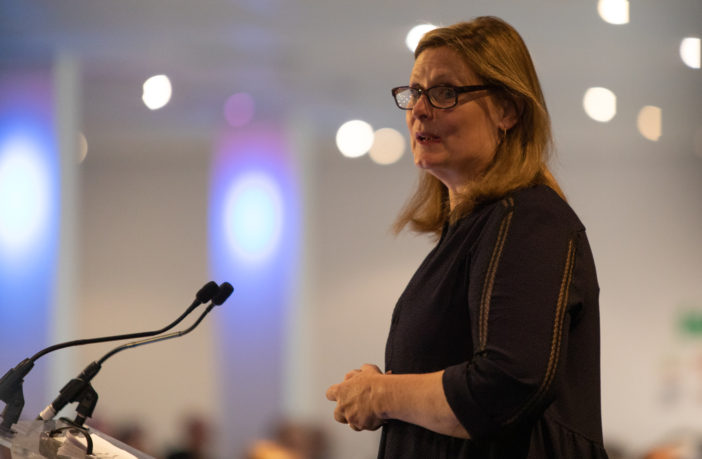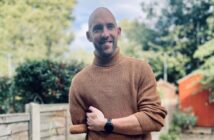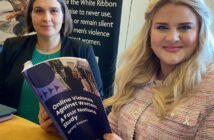A packed Pan-Commonwealth Forum 9 was treated to an engaging and inspirational address by Sarah Brown during which she called on governments and NGOs for more innovative thinking to finance global educational efforts. The challenge of providing education to displaced people, children and girls was also high on the agenda and mirrored many of the conference themes.
The Open University’s deputy vice-chancellor, Professor Josie Fraser, welcomed Sarah to the stage praising her efforts as a passionate advocate for education, for her philanthropic work and for the achievements through her charity Their World.
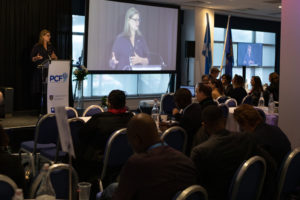
Opening session on day three of PCF9
Sarah took the opportunity to speak to the 61 nations present at PCF9 to share her experience of the educational efforts taking place in pursuit of the UN sustainable development goal 4 – provide education for all. She drew on her work as a campaigner for infant and child health and her involvement in developing sustainable education provision for marginalised groups. Clearly, much has been done towards meeting the UN’s goal, but Sarah’s experience showed PCF9 the enormity of the challenge ahead and the scale of those still in need of education.
She started by congratulating the OU on its achievements over the past 50 years and how it has been a vital pioneer in allowing people to study regardless of personal situation or unexpected challenges in their lives. She specifically commended the OU on being at the forefront of developments in mobile education, engaging in lifelong learning and provide education to areas most in need such as sub-Saharan Africa.
Education is the answer
One of the key themes of PCF9 is equity and inclusion in education, especially children, young people and girls. It was evident in Sarah’s speech that many of challenges relating to these themes are close to her heart.
“I’ve come to realise is that the greatest contribution we can make, whether we’re trying to address climate change, gaps around equality, wealth and skills or we want to look at the health of people around the planet, education offers a solution to all of those things. The thoughtfulness we need to bring to this challenge when looking at children that are caught in poverty, displaced or squeezed by the rapid change in our world. We have a deep responsibility to ourselves, and to them [the children]to find a way to offer an education to them.
“There are approximately 260 million children who are missing out entirely and it goes without saying that girls and the most marginalised and those on the receiving end of discrimination are carrying is disproportionate inopportunity.”
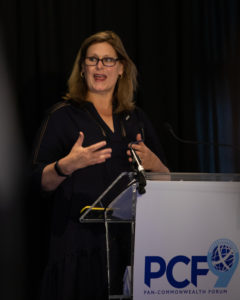
Sarah Brown acknowledged the task is overwhelming
Sarah acknowledged the UN sustainable goal of getting this number children in early, primary and secondary education by 2030 was an overwhelming task. The current trends suggest that if things remain the same, by 2030, the world will have closer to 400 million children leaving school without a basic primary education. And half of the children in the developing world will not have the basic skills need for the workforce – totalling about 800 million.
Average time of being a refugee is 17 years
As her speech moved into education to large populations of displaced people and how education is now begin recognised as a basic need in emergency situations.
“The humanitarian system was set up to address short term challenges of refugees on the move. Where there was conflict, natural disaster or where large populations suddenly needed to be supported. The notion of a refugee camp was something very temporary and the emergency work would be led around providing safety, shelter, nutrition, water, sanitation and medical care. At the end of that period, you would look to where people would go back to. Our world has changed so much. The average time a refugee is a refugee is now 17 years. When you think about the life of a child, this could be their whole childhood. This brought the education issue came to the fore.”
The solution was to create a funding system to support education in emergency situations. There were fears that funding education could detract from funding for nutrition or health. Now, the funding for education comes from different channels and in 2015 a new fund was created – Education Cannot Wait hosted by UNICEF.
Innovation in finance urgently needed
The UN sustainability goals has brought together an education commission that has helped to sharpen the focus on the need for education. A landmark document Learning Generation Report published in 2017 that has mapped out the scale of the need for funding and recommendations for large scale financing. Out of this report was created the International Financing Facility for Education which started to use innovative ways of financing to invest in today’s problem but is also an investment in the future.
The focus of International Financing Facility for Education is to create a 10-billion-dollar fund to target lower- and medium-income countries. It is for those countries whose economic situation is improving or for those emerging from a crisis who then won’t have access to emergence funds. Those are the countries who are posed to meet the educational challenges and who can be supported by this fund.
This innovative approach to financing will take collaboration and coalition. Education is bring brought to the forefront as the world faces a rapidly changing society and an increasing demand.
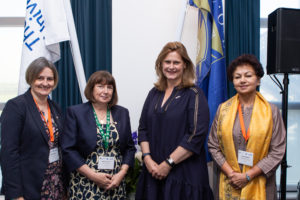
Left to right: Prof Josie Fraser, OU; Prof Mary Kellett, OU; Sarah Brown; Prof Asha Kanwar CEO of Commonwealth of Learning
Sarah Brown is an honorary graduate of The Open University, Chair of the children’s charity Their World and Executive Chair of the Global Business Coalition for Education. She has also co-founded the Maternal Mortality Campaign (2008-2011) and provides strategic leadership to worldwide efforts to save and change the lives of women and children.
